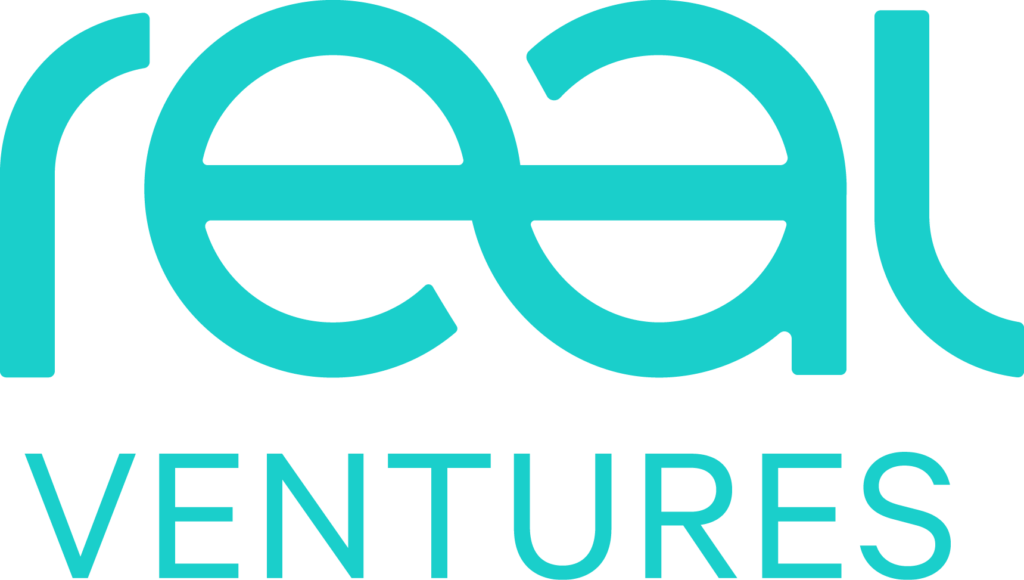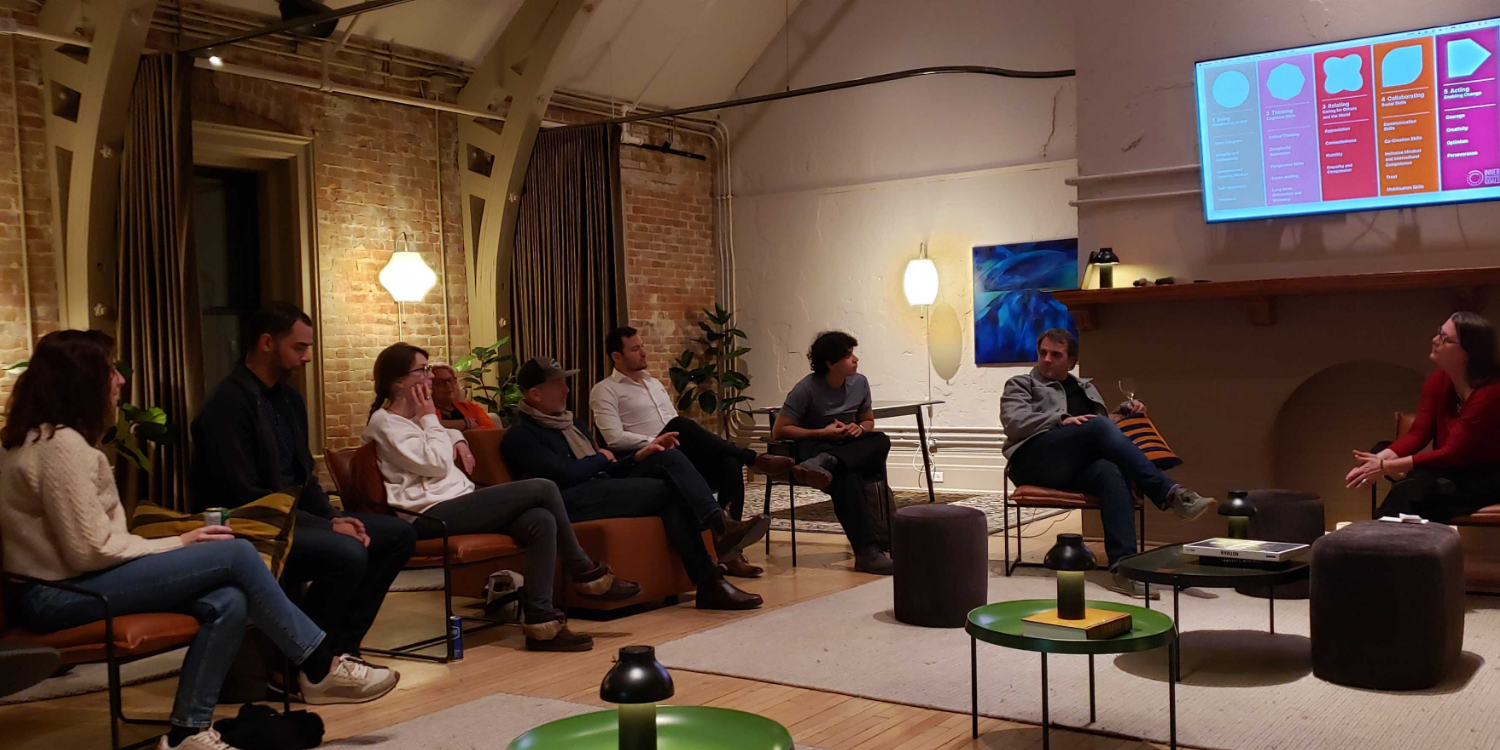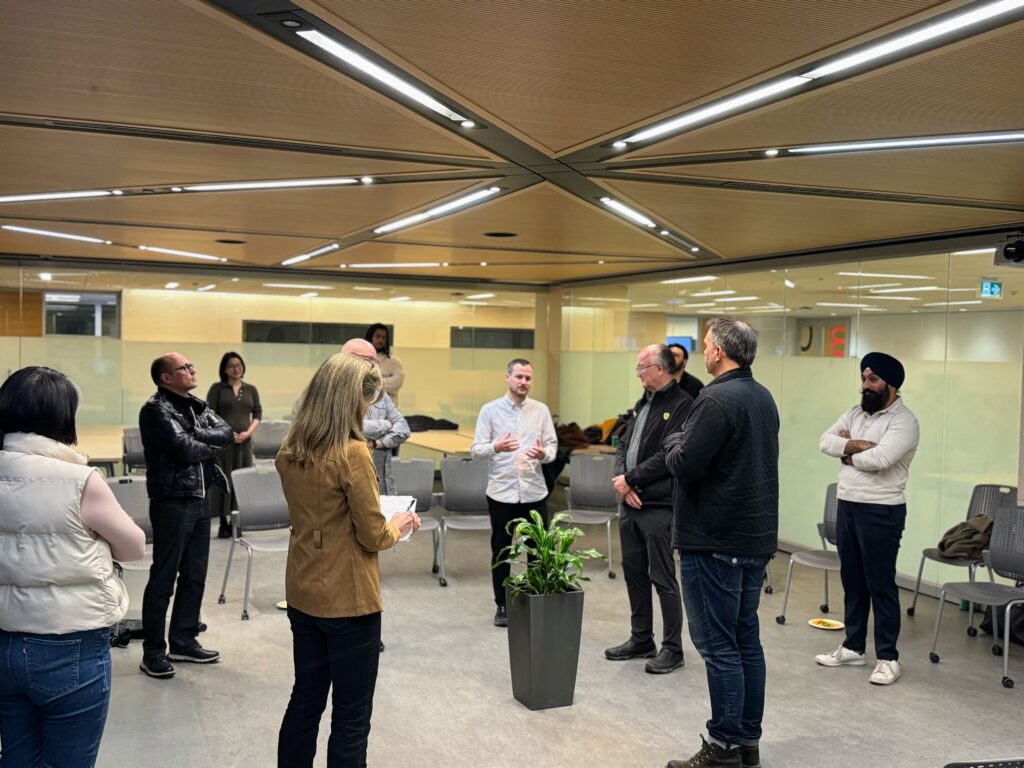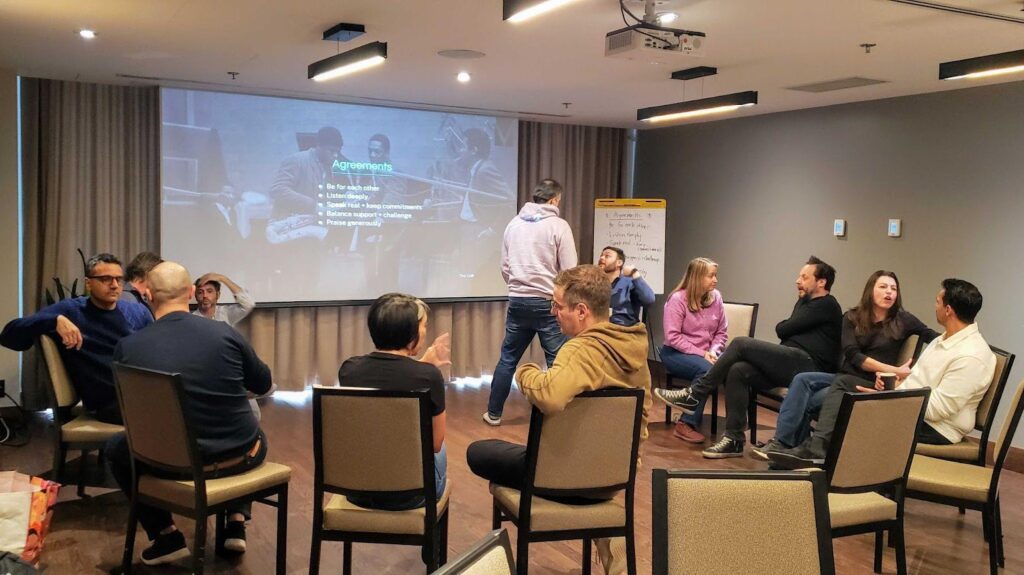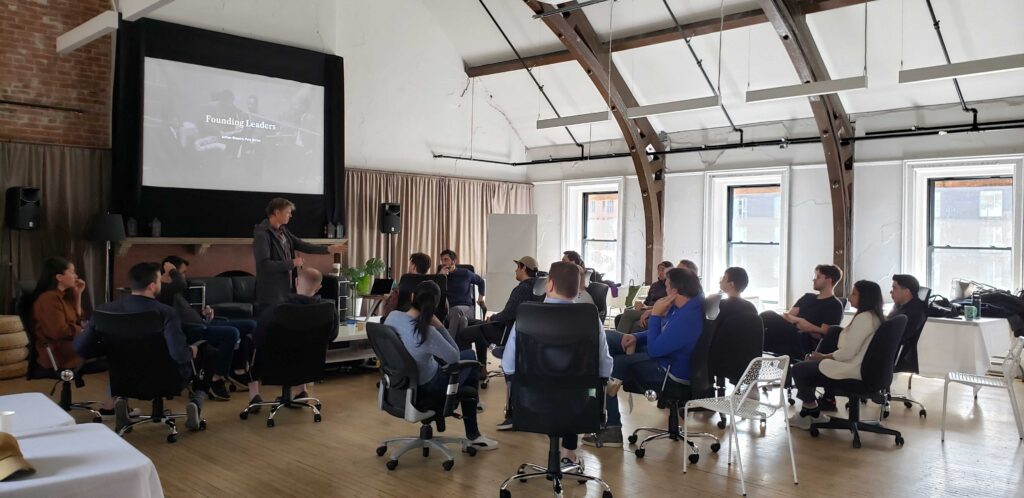A significant investment in the personal development of the founders driving innovation across Canada is needed to build sustainable, globally impactful, companies.
In the face of the ongoing global challenges stemming from the pandemic, geopolitics, and the collective inability to navigate the complexity and inter-connectedness of our world, Canadian entrepreneurs, like so many others, have had their grit, resilience, and mental fortitude thoroughly tested.
Amidst these tribulations though, Canadian innovation is holding strong, maintaining its rank as the 4th best country to launch a startup. Some of the more well-known factors that distinguish the great white north from other startup hubs include its strong support from the public sector, immigrant-friendly policies, the country’s vast natural resources, and Canada’s proximity to the world’s largest single economy.
Beyond these factors, the Canadian startup ecosystem distinguishes itself with a profound collaborative spirit. When times are tough, we need compassion, community, and a whopping dose of determination. Actions speak volumes, which is why Real Ventures chose to partner with two other leading Canadian investment firms, Panache Ventures and Inovia Capital, to bring back FounderFuel — Canada’s premier venture-backed accelerator program — and infuse some much-needed capital and mentorship into some of Canada’s most promising pre-seed startups.
And while capital and mentorship are necessary to support a healthy and sustainable Canadian startup ecosystem, we believe that a significant investment in the personal development of the founders driving innovation across Canada is also crucial. The numbers are telling. The latest BDC report on Canadian entrepreneurship highlighted an important decline, with 100,000 fewer entrepreneurs operating in Canada today compared to 20 years ago. While several factors have contributed to the decline, which we’ll dive into further on, what is clear to us is that a shift in perspective is needed to help entrepreneurs build the mental and emotional fortitude needed to navigate what will likely be a challenging global economy for some time to come.
Canadian Entrepreneurs are Fewer and Reporting Higher Levels of Burnout
The BDC’s October Entrepreneurship in Motion Study highlighted a stark decline in the number of entrepreneurs in the country. In 2000, three in every 1000 Canadians opted to launch a business. Today, only one in every 1000 Canadians are choosing this career path. While factors like increased global competition, an aging population, and a healthy labour market can certainly explain this decline, it’s also clear to us that the startup grind is a strong contributing factor. Just have a look at these numbers.
- 48% of founders experience burnout
- 55% of co-founders break up within four years
- 48% of founders get divorced vs the average 40% of first marriages
- 30% of founders suffer from depression
- 72% of founders mental health is negatively affected
After reading these troubling statistics, it’s no wonder new businesses have such low survival rates, with 1 in 3 companies closing within five years (and 2 in 3 closing after 15 years). The BDC’s study listed grit & relationship skills as the most impactful skills at all business growth stages to build high-performing companies. This insight rings true to us at Real Ventures after over a decade of working with entrepreneurs. We are convinced the key to solving these troubling problems is to invest in founder inner development. For years Real Ventures has been working with leadership experts, using frameworks and practices derived from adult development, conscious leadership, the Inner Development Goals, and others, to support founders in deepening their self-awareness and helping them build the mental fortitude and resilience needed to weather the challenges of building a venture-backed business.
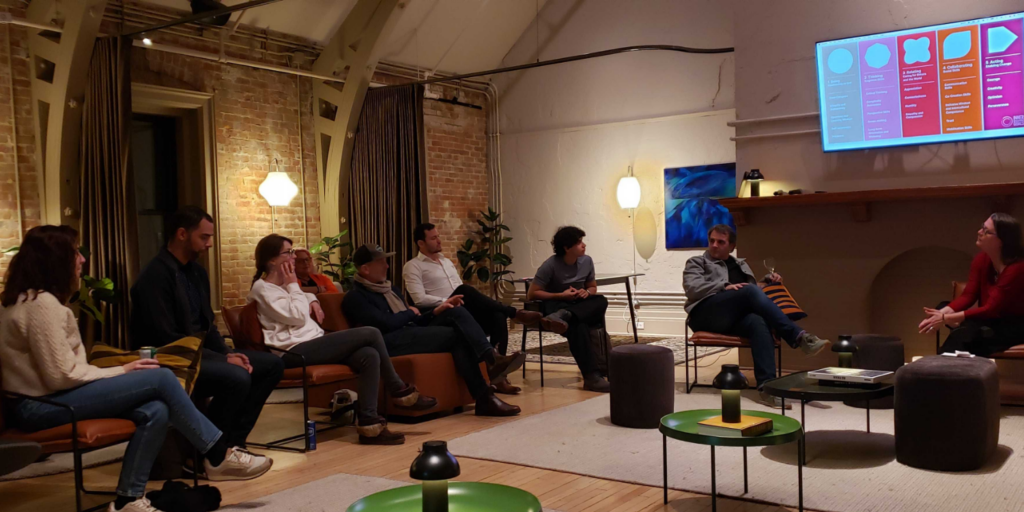
This fortitude and resilience need significantly more development within startup ecosystems, but that is not to suggest that it doesn’t exist at all. To appreciate its presence take a look below at the activity in some of Canada’s most active startup hubs and read our thoughts on significant events and insights that shaped the landscape in 2023.
Venture Capital Investments in Canada’s Three Largest Tech Hubs
VC Investments in Ontario
Maintaining with previous years’ investment trends, Ontario-based startups benefitted from close to half (46.2%) of all investment dollars invested in Canadian tech startups, with Toronto and Waterloo-based businesses securing $1.8B, and $360.6M, respectively.
As anticipated, challenging market conditions continued to dampen investor enthusiasm, resulting in a discernable decrease in the capital invested in the region when compared to the high-flying days of 2021. However, when compared to pre-pandemic investments, the Toronto-Waterloo corridor has seen an increase of $200M in capital invested ($2B in capital invested in 2019 vs $2.2B as of December 2023).
Delving into some of the province’s success stories, Tenstorrent, a Toronto-based Real Ventures portfolio company, is one of the province’s largest disclosed deals, having raised a $100M USD strategic round from a group of international investors led by the Hyundai Motor Group and the Samsung Catalyst Fund. BenchSci is another portfolio company that is on an impressive trajectory. The biotech startup closed a Series D of $95M CAD, on the heels of their 2022 $63M Series C round, to continue expanding their AI-powered drug-discovery platform. Mejuri, a global fashion brand that is revolutionizing the fine jewelry industry made impressive strides this year, launching a slew of new stores in 2023, bringing them to 24 stores in operation and another 5 that are on track to open before the end of the year.
VC Investments in Québec
Canada’s second-largest tech hub garnered $1.2B across 52 deals to date, with HealthTech and SaaS companies continuing to lead in venture investments. While Montreal remains the primary tech hub in Quebec, accounting for 82% of all investments in the province, promising growth is evident in Quebec City and Sherbrooke.
Sherbrooke stands out with its burgeoning quantum ecosystem, supported by a well-established network of research institutes and experts and a growing number of quantum companies focused in areas like quantum computing. Notably, Quantum Sherbrooke launched last year as the first of two innovation zones, securing over $435 million in investments from the province and various organizations, propelling Sherbrooke into a world-class quantum research and development hub.
Despite the economic downturn, promising Quebec-based companies continued to raise capital and expand. Among them is Dcbel, a sustainable energy company based in Montreal that leverages by-directional EV charging to power smart homes. They announced their $50M USD Series B raise in August, enabling them to deliver more home charging stations to eager customers seeking to live more sustainable lifestyles. Sparks Microsystems, a fabless semiconductor company operating in the gaming space, also secured a noteworthy Series B totaling $34M CAD in March to help meet the increasingly strained global chip demand.VC
Investments in British Columbia
The province of British Columbia continued to see a decrease in capital allocated to its companies, with a total of $1.1B in venture capital investments across 40 deals in 2023, the lowest amount invested over the last five years, with the exception of 2020, where the Pacific Province garnered $964M in VC capital. What can explain this continued downward trend? For one thing, the number of deals concluded at most stages has consistently decreased over the past three years. Particularly worrying is the dramatic decrease in investments made in Pre-Seed and Seed Stage companies. In specific terms, Pre-Seed deals dwindled from 20 in 2021 and 15 in 2022 to a mere 3 in 2023. Similarly, Seed-stage deals plummeted from 49 in 2021 and 29 in 2022 to just 7 in 2023.
Without a substantial re-investment in promising early-stage companies in BC — of which there are many, including Artemis, a data automation company built for analysts that was selected to participate in this year’s FounderFuel program — we will likely continue to see fewer growth companies emerging from the province and a loss of the economic benefits ( job creations, innovation and research, global competitiveness, and diversification of the economy,…) that come from a healthy tech sector.
Fundraising Amidst Market Slowdowns
The economic downturn has continued to shape a challenging fundraising landscape for founders and venture capitalists alike. With the Bank of Canada’s key rate likely to remain at 5.0% as we enter 2024 to relieve persistent inflation pressures, we will likely continue to feel the effects of the market slowdown throughout the startup ecosystem.
Similar to 2022, companies that show sound financial planning, are cautious with resources, and focus on optimizing operations and generating traction within their markets are far more likely to win the attention of investors and receive term sheets.
Canada’s numerous and generous non-dilutive funding programs have long made the country a very attractive place to launch a business. Given unfavorable market conditions leading to lower valuations, more founders are unsurprisingly pursuing these funding options, with over $300M invested in startups this year.
As entrepreneurs mature alongside our ecosystem, it’s fantastic to see more and more founders take advantage of the billions of dollars available through tax credit programs like SR&ED and the The Interactive Digital Media Tax Credit (IDMTC), grants programs like the Industrial Research Assistance Program (IRAP) and the Natural Sciences and Engineering Research Council of Canada (NSERC), and loan programs like the ones offered by Futurepreneur. For more information about the numerous non-dilutive funding options available to Canadian entrepreneurs, Boast AI, a company that helps startups claim their eligible R&D tax credits, offers an excellent overview here.
Other exciting funding opportunities announced this year include an expansion of the Venture Capital Catalyst Initiative (VCCI) in which the Canadian government is investing up to $50M into an inclusive growth stream with the purpose of accelerating diversity, equity & inclusion in the VC ecosystem. The federal government also launched the $755M Social Finance Fund, offering additional flexible funding sources to organizations tackling social and environmental challenges. Following an open process, Boann Social Impact, Fonds de finance sociale — CAP Finance, and Realize Capital Partners were selected to act as investment managers for the fund. In addition to contributing towards creating a brighter future for Canadians, initiatives funded through the Social Finance Fund will help Canada make important progress on the Sustainable Development Goals (SDGs).
Entering a New AI Era
Unless you’ve been living under a rock, you’re likely familiar with this generation’s gold rush: AI. Since Open AI launched ChatGPT and DALLE at the end of 2022, advanced AI platforms have taken the tech world by storm, with industry behemoths like Google, Facebook, and Microsoft (now an Open AI investor) and young startups alike racing to adopt and/or create their own AI platforms. For the first time in history, technical and non-technical people alike can easily access AI to support them in executing increasingly complex tasks like proofreading and editing an article (guilty!), generating creative content, or coding and debugging, just to name a few. The realms of possibility this historical technology has unleashed are vast and data-rich organizations serving all spheres of society are exploring innovative ways AI can improve people’s lives.
Similar to past global technological disruptions, the mass adoption of AI has also prompted serious and legitimate concerns. It has become exponentially easier for groups and individuals to leverage AI to create and spread misinformation to promote their own aims and sway public opinions, creating further divides between conflicting groups and eroding trust at all levels of society. Yoshua Bengio, who is widely recognised as one of the grandfathers of AI, has been very vocal throughout 2023 about his concerns over the misuse of AI and the destructive potential of the technology if left unregulated.
In September, the Canadian government launched the Voluntary Code of Conduct on the Responsible Development and Management of Advanced Generative AI Systems as a bridge to encourage the safe and ethical development and use of AI-powered products and services until the proposed Artificial Intelligence and Data Act (AIDA) comes into force. The Code of Conduct is built on the foundation of 7 core principles: accountability, safety, fairness & equity, transparency, human oversight & monitoring, and validity & robustness. To date, 16 organizations have signed, including major AI research institutions, the Vector Institute, based in Toronto, and Mila, based in Montreal.
There is also a very legitimate fear that capitalist ambitions will greatly overshadow societal needs when it comes to the applications of this technology. The world is falling short of meeting most of the 2030 Sustainable Development Goals (SDGs) set by world leaders during the 2016 UN Summit. Since the industrial revolution, global temperatures have increased between 1.1 and 1.3 °C and, as it stands, humanity is facing a rise of 3°C in global temperatures by 2100, which will result in disastrous consequences worldwide. More than ever, humanity needs to leverage all the resources at our disposal, including AI, to make meaningful progress toward meeting these goals.
As investors, we believe we have an important role to play by not only making investments in promising companies that are directly addressing SDGs, but also by making significant investments into the personal development of the founders leading these businesses to increase their chances of making a meaningful impact.
Grit and Compassion Will See us Through
Adversity is an opportunity for growth. Few people know this as well as seasoned founders who have weathered many storms to come through on the other side wiser and more resilient. As we acknowledge that challenging times are likely to persist, we see this as an opportunity for all members of the Canadian startup ecosystem to consider new ways of thinking in relation to business building and VC investing, and to explore frameworks like the Inner Development Goals to solve the most pressing challenges our world faces. In this era of uncertainty, fostering resilience and innovative thinking is our collective path forward to shape a more sustainable and impactful future.
